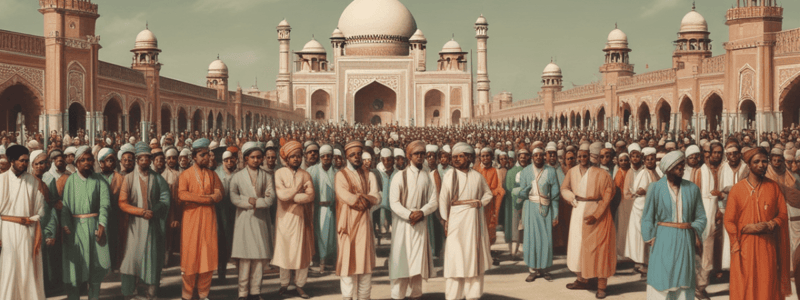Podcast
Questions and Answers
What was the outcome of the Congress Rule that led to the movement for a separate Muslim homeland?
What was the outcome of the Congress Rule that led to the movement for a separate Muslim homeland?
- Muslims felt they were being unfairly treated by the government
- The British government granted freedom to India
- The Muslims felt a sense of unity with the Hindus
- The Hindus showed that Hindu government would mean an anti-Muslim rule in India (correct)
According to Quaid-i-Azam's article in Time and Tide, what did he conclude about Muslims?
According to Quaid-i-Azam's article in Time and Tide, what did he conclude about Muslims?
- That they are a minority in India
- That they are a majority in India
- That they are a nation (correct)
- That they are anti-Indian
When and where was the Lahore Resolution passed?
When and where was the Lahore Resolution passed?
- March 24, 1940, in Lahore (correct)
- March 13, 1940, in Delhi
- March 15, 1940, in Mumbai
- March 22, 1940, in Karachi
What was the main concern of the Muslims regarding the Constitution, according to Quaid-i-Azam?
What was the main concern of the Muslims regarding the Constitution, according to Quaid-i-Azam?
What was the main proposal of the Lahore Resolution?
What was the main proposal of the Lahore Resolution?
What was the significance of the Lahore Resolution, according to Jinnah?
What was the significance of the Lahore Resolution, according to Jinnah?
What did the Lahore Resolution emphasize regarding minorities?
What did the Lahore Resolution emphasize regarding minorities?
What was the significance of the Lahore Resolution?
What was the significance of the Lahore Resolution?
What was the British offer in August 1940?
What was the British offer in August 1940?
Why did the Congress reject the British offer in 1940?
Why did the Congress reject the British offer in 1940?
What was the outcome of the Cripps Mission in 1942?
What was the outcome of the Cripps Mission in 1942?
What was the Congress' demand during the Quit India Movement?
What was the Congress' demand during the Quit India Movement?
What was the Muslim League's response to the Quit India Movement?
What was the Muslim League's response to the Quit India Movement?
What was the main point of contention between Gandhi and Jinnah during their talks in 1944?
What was the main point of contention between Gandhi and Jinnah during their talks in 1944?
What was Jinnah's stand during the Gandhi-Jinnah talks?
What was Jinnah's stand during the Gandhi-Jinnah talks?
Flashcards are hidden until you start studying
Study Notes
The Lahore Resolution, 1940
- The experience of Congress Rule led Muslims to demand a separate homeland, as Hindus would impose an anti-Muslim rule in India.
- Quaid-i-Azam's article in Time and Tide concluded that Muslims are a nation, and no constitution can be enforced by ignoring them.
- Quaid-i-Azam stated on March 13, 1940, that if a satisfactory settlement cannot be found for Muslims in united India, they will demand the country's division.
The Lahore Resolution
- The Muslim League held its annual session at Lahore on March 22-24, 1940.
- The Lahore Resolution was moved by Maulvi Fazlul Haq and seconded by Ch.Khaliquzzaman, and finally approved on March 24, 1940.
- Jinnah expressed that the Indian problem is not communal but international, and no constitution can work without recognizing this reality.
- Muslims would not accept a constitution that establishes a government of the Hindu majority on them.
Text of the Resolution
- The Federal system under the Government of India Act, 1935 was not acceptable for the Muslims.
- No revised constitutional plan would be acceptable unless it was framed with their approval and consent.
- Adjacent units where Muslims are in a majority, as in Northwest and East, should be constituted as Independent States.
- The constituent units would be autonomous and sovereign.
- Protection of minorities would be given priority.
Significance
- The Resolution did not specify any demarcation of the territory but defined the future plan of struggle for the establishment of Muslim states.
- It intended to give importance to the autonomy of the states.
- The word "Pakistan" was not used, but it was the kernel of the Resolution.
Later Developments
- The British announced an offer in August 1940, including expansion of the Viceroy's Executive Council, setting up of National Defence Council, and special importance to the views of minorities.
- The Congress rejected the offer and started the Non-Cooperation movement (1940-41).
- The Lahore Resolution remained the ultimate goal for the Muslim League.
- The Cripps Mission (March 1942) proposed dominion status, an Indian constitutional body, and representation of princely states.
- The Congress and Muslim League rejected the proposals.
- The Quit India Movement (August 1942) was launched by Hindus, while the Muslim League stayed aloof.
- Gandhi-Jinnah Talks (September 1944) failed to resolve differences, as Jinnah refused to budge from the Muslims' ideological and constitutional demand.
Studying That Suits You
Use AI to generate personalized quizzes and flashcards to suit your learning preferences.




